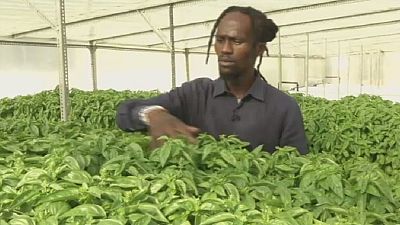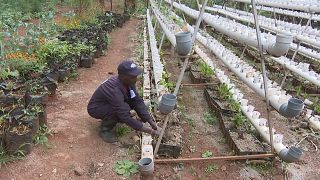South Africa
Nhlanhla Mpati is tending his farm in Johannesburg, South Africa. Mpati is among a group of farmers in the country who are growing herbs and other crops on rooftops in urban cities.
He is part of project run by various organizations that wants to make more produce available in the inner city and provide jobs for entrepreneurs who want to farm but don’t have access to land.
Mpati grows basil and other herbs at the farm using a hydroponics system on top of the city’s Chamber of Mines building.
The technology allows one to grow crops using dissolved nutrient solutions in water instead of soil.
It also helps farmers make use of limited spaces to grow crops.
“I’ve been growing basil for the past three years so I’m experienced with it but it was soil-based farming, nothing in hydroponics, this was my first grow and that’s why I chose basil. I knew how to grow the crop, it was very profitable and I knew I’d get a better price at market because it’s a crop that they’re currently struggling to get and that was validated with my first harvest,” said Mpati.
The plants are placed in pipes through which water and nutrients are pumped throughout the day.
Researchers say high food prices can be tackled through hydroponics, by making more food available locally instead of depending on produce coming in from farming regions.
About 100 buildings have already been identified where similar farms in the city will be set up.
Mpati is able to produce over 100 kilograms of basil in 21 days.
“For the current system we’re using is called NFT (Nutrient Film Technique) it’s a recycling water system. So I chose this specific system because it is a very efficient system when you’re growing vegetative crops; crops that produce a lot of leaf mass, like your basil, thyme, your rosemary, your mint, so you get a better yield, better quality.,” said Mpati.
Some say hydroponics was used as far back as the Hanging Gardens of Babylon, one of the seven wonders of the ancient world.
The program known as the Urban Agriculture Initiative was started by Wouldn’t It Be Cool or (WIBC) a monitorship and incubation outfit that offers advice and funding to young entrepreneurs from disadvantaged backgrounds, who have innovative ideas.
Dr. Michael Magondo is the head of Idea Sherpa at Wouldn’t It Be Cool.
“With this one of the things we were looking at was you know how do you create opportunities that create employment and we know agriculture is one of the biggest employers within the economy you know, but how do you bring agriculture to the city because the entrepreneurs we work with were predominantly around the city, here and in Pretoria. So we were looking at concepts about agriculture and slowly we started playing around with this idea and hydroponics the technology really opened up the opportunity to actually say you can do it, it doesn’t require a lot of effort and the technology exists it’s just bringing it into the right space and then creating a sustainable business model to allow those entities to be able to operate,” he said.
As land becomes scarce and water supplies dwindle, environmentalists are looking for more sustainable ways to produce food.
Mpati sells his basil to restaurants like the city perk café where it’s used to prepare various meals and snacks.
“We are also trying to get better quality food obviously at a good price as well, I think everyone in the market is in the same boat and as a keen restaurateur you’re always trying to improve the quality of your food, improve the quality of your produce. So when we heard about Nhlanhla and the hydroponics station on the roof that Chamber of Mines kind of gave them, we kind of hooked up straight away and we went and saw them. The beauty about hydroponics as you know is that it’s organic, pesticide-free, there’s no hormones, there’s no preservatives, there’s no pesticides, nothing,” said city perk café owner, Alexi Lambropoulos.
Mpati is working on plans to expand his farm further and employ two workers to help as he exploits agribusiness opportunities cropping up in the city.












01:00
Pix of the Day January 28, 2026
01:51
In Ivory Coast, cocoa farmers have nobody to sell their produce to
02:13
Families bid farewell to schoolchildren in South Africa killed in a school bus crash
01:01
South Africa to step aside from G20 during United States presidency
00:29
South Africa's Kruger park suffers 'devastating' damage from floods
00:08
Ivory Coast to buy entire stockpile of cocoa beans as stocks pile up